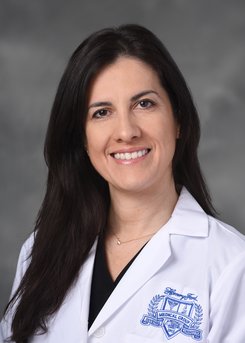
Mariela Mendez, PhD
Specialties: Research
Board Certification and Education
- University of Buenos Aires, Pharmacology, 2005
- University of Cordoba, Biochemistry, 1998
About Me
Titles
- Assistant Scientist-Hypertension and Vascular Research Division, Henry Ford Hospital
- Assistant Professor (FTA) - Department of Physiology, Wayne State University
My work for the past ~10 years has focused on understanding the molecular mechanisms of renin biology and release. The field of renin biology has been understudied at a molecular level, in part due to the lack of technological developments to either isolate or study cells that produce and release renin. In order to increase knowledge in this area my lab has developed several new tools (single cell imaging, transcriptomics, sequencing) to study very basic mechanisms of renin biology. The goal is to discover new genes or pathways that control or regulate renin secretion in health and disease to develop better targets for the treatment of hypertension.
- Regulation of SNARE-dependent renin granule exocytosis: The major role of this project is to understand the mechanisms of renin granule exocytosis, stimulated by cAMP and identification of the proteins involved.
- ROS dependent-stimulated Renin release: role in Hypertension and Diabetic nephropathy: Hypertension affects up to 50% of patients with type 1 diabetes (20-25 million in the US), speeding up the progression of kidney dysfunction. The pathogenesis of hypertension in diabetes involves the activation of the renin-angiotensin system (RAS). Renin is the rate-limiting enzyme in the activation of the RAS and is essential for blood pressure control. The only source of the circulating hormone renin is the renal microcirculation, specifically Juxtaglomerular Cells (JG cells) where renin is expressed as an immature pro-peptide ((pro)renin). However, in type 1 diabetes higher plasma (pro)renin and increased intra-renal renin are associated with hypertension and kidney dysfunction. The mechanisms by which diabetes enhances plasma (pro)renin and intrarenal renin are not clear. While it is well established that the renin-angiotensin system is activated in diabetes and contributes to hypertension, the role of the JG cell and the renin and pro-renin they store has not been studied in detail.
Our approach involves cellular, biochemical, immunological, genetic, molecular biological and whole animal physiological approaches in an experimental model of diabetes.
Awards & Honors
- NIH/NHLBI FOCUS/PRIDE programs for Advanced Early Stage Investigators. UCSD. La Jolla, California (2019 - 2020)
- Travel Award, Gordon Research conference on Angiotensin. Ciocco, Italy (2020)
- Top 2% abstract graded. American Heart Association. Council of Hypertension. Invited to present at Scientific Sessions (2017)
- NIH-NIDDK RO3. Small Grants for New Investigators to Promote Diversity in Health-Related Research (2015-2019)
- Winner, top award for scientific merit (Cash Award), 13th Annual Research Symposium, HFMG Academic Programs, Henry Ford Hospital, (2016)
- Winner, top award for scientific merit (Cash Award). Henry Ford Health System. 12th Annual Research Symposium, HFMG Academic Programs, (2015)
Videos and Articles
-
Videos
-
Blog Posts
Locations

Hospital Privileges
- Henry Ford Hospital
.svg?iar=0&hash=F6049510E33E4E6D8196C26CCC0A64A4)

/hfh-logo-main--white.svg?iar=0&hash=ED491CBFADFB7670FAE94559C98D7798)

/hfh-logo-main--white.svg?iar=0&w=300&hash=6384A2E70E92039C36CA5CCBA53F8964)